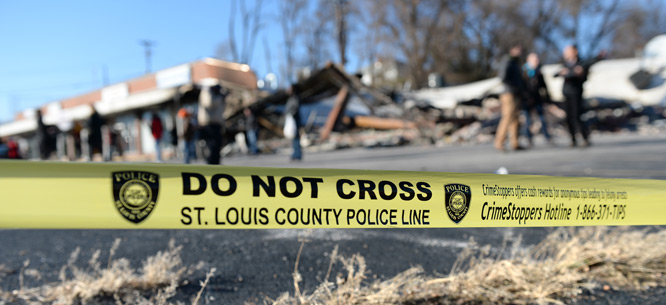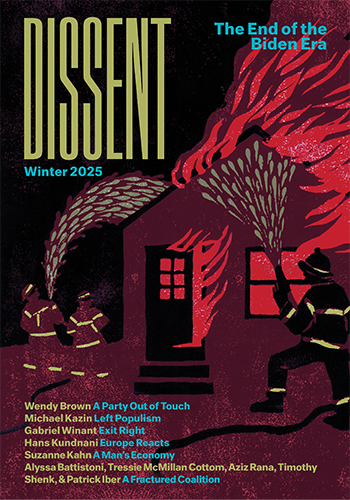Property-Based Ethics
Property-Based Ethics

Earlier this year, information scientist Simon DeDeo argued in the science magazine Nautilus that British society has slowly transitioned from one in which theft was a crime equal to or worse than murder into one in which murder and other violent crimes are taken far more seriously than theft. It now seems bizarre to imagine a world in which private property is considered a greater moral good than human life. And yet, in light of recent high-profile police killings, it is hard to dispel the queasy feeling that we are living in such a world, or a shadowy version of it.
Since it was announced that Michael Brown and Eric Garner’s murders will receive no response from local justice systems, there have been widespread protests and sporadic riots. In the course of those protests and riots, there has been property damage and looting. Much of the media—especially the right-wing media—has been deeply troubled by this property damage.
It’s time to hold protestors accountable, writes a Republican strategist in the Daily Beast. Make those protestors pay for property damages, says Fox News. Why can’t you just protest like Martin Luther King Jr., all non-threatening and respectful of my property rights, wonders USA Today. President Obama himself entered the fray to assure the public that those who engaged in vandalism and looting after the Ferguson decision will be prosecuted. (The fate of Darren Wilson, despite an ongoing federal investigation, remains less clear.) Many, in their calls for protesters to pipe down, have enlisted the name of MLK, whose own robust democratic socialism—and accompanying qualms with the primacy of property—have been whitewashed from American memory. “When . . . profit motives and property rights are considered more important than people, the giant triplets of racism, materialism, and militarism are incapable of being conquered,” King said in 1967.
But dead men loot no stores. In that way, they’re appealing figures for a culture that can’t quite work out if it values teenagers over flat-screen TVs. This is why the media is awash in foot-stamping demands that protesters be more like ghosts, and why the deaths of Michael Brown, Eric Garner, Kimani Gray, and countless other victims of police brutality are so quickly eclipsed by coverage of looting. Thus headlines mourn AutoZones while treading delicately around the murders of human beings. One can be bothered by both, comes the aloof refrain—which is true, but the fact that it isn’t obvious which concern should take precedence only underscores the problem.
Where does this confusion of priorities originate? Arguably, in the very foundations of Enlightenment liberalism. John Locke’s 1689 discussion of property in his Second Treatise on Civil Government establishes ownership as a fundamental relationship between the self and the outside world, with important implications for governance. In Locke’s thought, the justification for private property hinges upon one’s self-ownership, which is then applied to other objects. “Every man,” Locke writes in the Second Treatise, “has a property in his own person: this no body has any right to but himself.” Through labor, Locke continues, the individual mixes a piece of herself with the outside world. Primordial self-ownership commingles with material objects to transform them into property.
According to this logic—property as the metaphysical lending of selfhood to stuff—crimes against property become crimes against individuals. If your property isn’t secure, you aren’t secure in your own self-possession; the autonomous subject of the liberal imaginary is threatened. Protecting property, therefore, is no less fundamental than protecting the human lives in which it shares.
And that’s where policing comes in. It’s precisely in enforcement that the tensions between property-based ethics and respect for human life become most apparent. These tensions, too, go back as far as Locke’s day, when—as police historian Samuel Walker has argued—slave patrols emerged as “the first modern [police] forces in this country.” The defense of a system that saw human beings as property might seem to contradict Locke’s notion that self-ownership comes before ownership of property. But Locke himself was evidently not too troubled by the contradiction. Despite a certain ambivalence in his own writings on slavery, he lent his name to documents like The Fundamental Constitutions of Carolina, which gave “Every freeman of Carolina . . . absolute power and authority over his negro slaves.”
Darren Wilson might not have been thinking of Locke when he drove six bullets into Michael Brown’s body. But the sanctity of property in liberal—and, more broadly, American—thought helps explain why we let him get away with it. Wilson cited the cigarillos Brown allegedly stole as a factor in his pursuit, and footage of the robbery was deliberately released to color the grand jury’s decision. Such narratives make police violence look coherent and necessary; police, after all, must intervene to regulate and secure the exchange of privately owned goods, come what may. They foreclose the question of whether or not property is worth killing over: it isn’t relevant; this is just what police do. There’s a reason Locke’s theory of property occurs within a treatise on government.
In a culture that idolizes property to the point of conflating it with persons, even laws intended to protect human life can be invoked in the defense of property. “Castle doctrine” and “stand your ground” laws are sets of legislation that foreground individuals’ right to use lethal force in response to an intruder. Right now, in Montana, Markus Kaarma is on trial for the murder of an unarmed seventeen-year-old German exchange student who entered his open garage in search of booze. Kaarma had left the garage open intentionally, evidently hoping to kill an intruder after his home had been broken into twice. His defense team is using “castle doctrine” to defend him, as did the attorneys of Byron Smith, a Minnesota man convicted earlier this year of murdering two unarmed teenagers for a similar break-in. Smith’s defense failed, and it’s possible Kaarma’s will as well. But the fact that both defenses have turned to laws supposedly intended to promote self-defense to extend to the defense of property demonstrates that the idea has some traction. Markus Kaarma and Byron Smith evidently felt their stuff was worth a life, and that idea did not seem ludicrous to Sean Hannity, among others. The line between self and property, it seems, remains perilously hazy.
The intense distress over looting and property destruction follow in this same vein. Sure, people are being killed by police without any recourse or redress, but these killings command little media attention until popular outrage against them begins to threaten property. The people who threaten property, in turn, earn as much condemnation as the killers who prompted this reaction in the first place.
No doubt property has a place in the order of things—a “social function” that we can measure in relation to whether or not it serves human flourishing. But as a society, we remain very much mistaken about where property fits in the matrix of moral values. As long as kids lying dead in the streets are of less interest to major publications than car dealerships blazing in the night, we’ll know we have a problem.
Elizabeth Stoker Bruenig is a PhD student at Brown University studying Christianity and private property. She has written for the Boston Review, Jacobin, America magazine, and others.
An earlier version of this article appeared at elizabethstokerbruenig.com.




